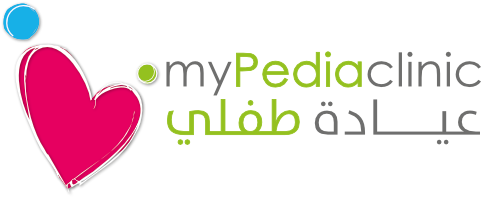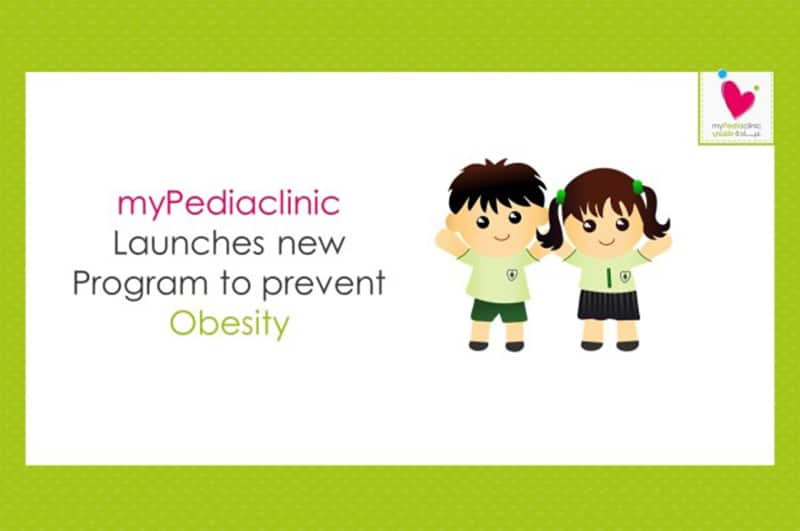A one of a kind obesity prevention initiative in the middle east developed by Mirna Sabbagh, nutritionist , dietitian, and IBCLC at myPediaclinic (Voted best pediatric clinic in Dubai)
What is obesity?
Obesity is when a person, child or adult, has excess body fat. The body fat has to be a certain level to be labeled “overweight” and then “obese”. For adults this is based on a calculation that takes into consideration weight for height. However with children it is based on another classification that takes weight, height, and the child’s age and is often plotted on a chart. Many children would be classified as overweight and as obese, however the doctors never mentioned it to the parents, either because they never calculated it, or did not give it importance or because they only looked at Weight for Age but not weight for height. To find out if your child is classified as overweight or obese, contact our nutritionist via e-mail or phone with your child’s latest weight and height and birth date and she will provide you with the classification of underweight, normal, overweight, or obese.
What is the problem if a child has excess fat?
Most parents will think a child who is overweight or obese will simply grow out of it as he or she gets older. However, this is simply not the fact. Children will often tend to gain even more weight and become obese teenagers, obese adults, and this will also affect their offspring creating a very dangerous vicious cycle with obesity world wide. This begins with overfeeding children milk in infancy, then food in toddler years, and the wrong combination of food throughout life completely changing the child’s perception and acceptance of food and their stomach capacity.
“Children do not simply outgrow being overweight or obese”
What are the consequences of the excess fat for children?
Excess fat and obesity directly affects the development of diabetes, cholesterol, and hypertension. Please read the sentence again. These are not just stacked words. Can you imagine an 8 year old with diabetes? One of the most difficult diseases to manage even as an adult. Diabetes, a preventable disease through proper nutrition, is spreading as if it were an infectious disease in our middle eastern countries. In the UAE alone, 40% of school children are overweight or obese. Not only that but diabetes leads to kidney diseases that may be fatal. High cholesterol and hypertension leads to heart diseases. We are seeing heart diseases in children! This is alarming. Almost one of two children is at risk of diseases that were unheard of before the ages of 50 or 60 before. One out of two children is at risk of taking life long medication that further affects their health and more importantly their quality of life. Is this genetic? We know obesity has some genetic base but the majority of it is caused by their food intake. Yes, their food intake. Many parents believe they are providing the right foods, only to find out they have been misled with wrong information and powerful marketing of the food industry.
The solution for childhood obesity is often to put the child on a restricted diet that includes removing all unhealthy foods and replacing them with healthy foods which often leads to the child being upset, depressed, but also incapable of consuming the new healthy foods which leads to a cycle or yo yo dieting and eventually giving up. The other solution is asking children to work out, which can never be enough if the child is not eating well. The final solution, is for children to do bariatric surgery which has now become very common. Trying to reverse obesity in a child is much more difficult than preventing it.
For this reason we have launched a new program that tackles obesity before it starts. It is seperated into 3 stages.
Stage 1: From fetus until 6 months.
Stage 1 focuses on nutrition during pregnancy for the mother as the science of epi-genetics now tells us that what the mother eats during pregnancy affects baby’s acceptance of foods and also their obesity probability. We then focus on the baby’s first food outside the womb, and help mothers to breastfeed their babies exclusively for 6 months before adding complementary solids. This greatly reduces the risk of obesity and diabetes later on in life. Also helps the baby start self-regulation from an early age.
Stage 2: From first food until 3 years.
Stage 2 is an extremely essential stage. It sets the child’s feeding pattern for life. During this period picky eating develops, along with micro-nutrient deficiencies that can affect the child for life and cause stunting (short stature) which can not be reversed after the age of 2. Stage 2 nutrition counseling focuses on educating and empowering parents on the type of food to give the children, the quantity of the food, and more importantly food attitudes. It enlightens the parents about how to read labels and pick the best option for the children along with food plans for every day of the week.
Stage 3: 3 years until teenager years
By this age children would have already developed their food preferences, what we do is an assessment of their food intake, followed by a Body analysis specifically for children done using an inBody machine. The inBody analysis is made to be easy to understand by children. It gives them an overall grade out of 100 which helps them monitor their own improvement. The inBody assesment explanation is then followed by counseling children directly along with their parents so the children can make the right choices themselves along with the parents support.
By doing this, you can ensure that your child has a strong base that is resistant to obesity and diabetes and cardiovascular diseases. Whether you would like to learn how to have a healthy diet during your pregnancy, or for your child from now in order to prevent obesity, or have a child who you suspect is overweight or obese, this is the moment to act. Don’t wait, call our clinic and ask for the next available nutrition counseling appointment.





